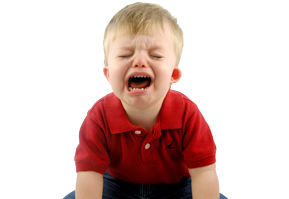Tips on Toddler tantrums
09/10/14 13:07
It can be quite a shock when our precious little angel starts to behave like those older children we’d seen in the playground only a few months before, or when our darling son goes up and hits a stranger on the head or sinks his teeth into an arm in frustration.
Unfortunately tantrums will be part of life for all our toddlers to one extent or another, so I thought I’d give you my tips on ways of handling them or trying to avoid them.
Firstly it’s important to say that temper tantrums are totally normal and form part of the growing up and learning process. There seems to come a point when our little people want to express their independence and test the boundaries to see how we’ll respond.
Factors affecting tantrums
Most toddlers exhibit some degree of tantrums from the age of 18m-36m. This could be anything from screaming, kicking, running off, falling to the ground or crying.
Hunger and tiredness can play a big part, as can overstimulation or frustration at what another child is doing e.g. pinching a toy, or at being unable to express what they want.
The character of your child also plays a big part, as can being told NO or what to do all the time. You could allow your little one more independence by giving them ‘controlled’ choices e.g. would you like to wear the blue or red top, or shall we go to the café or the swings?
What can you do to help ?
1.Try to ensure your child has regular mealtimes and naps where possible, as a hungry and tired child is much more prone to tantrums.
2. If you can spot a tantrum on the way, try to catch it before it happens and distract your child with something else.
3. Try to remain calm (even if you don’t feel it!)when your little one is trantrum-ing as shouting or being aggressive towards them can often makes things worse and escalate out of control. If you can’t avert it, it’s best to wait until they have calmed down to reason with them.
4. Pick your battles and be consistent. If the tantrum is caused by your child not getting something, don’t give in to stop the tantrum.
5. Give positive, descriptive praise. If your child has done something well, be specific when you praise them. For example if they’ve put their shoes on by themselves, don’t just say ‘good girl’, instead say ‘ wow that was brilliant the way you managed to put on your shoes all by yourself,’ That way she understands exactly what you were praising her for and will hopefully do it again! Similarly if she draws a picture and asks what you think, be specific about what you like e.g. I really liked the way you drew the sun - bright yellow and round.’
6. Don’t give the tantrum too much attention. If your little one has hit another child, don’t give your child all the attention. Instead focus on the other child and how they are feeling. By focusing on the hurt child, your child will see that hitting doesn’t get your attention, instead it gets them less.
7. Be reasonable and find out why your child might have hit someone. For example it may have been that they had their toy pinched or they were pushed first and they are just retaliating. Make sure that the other child’s behavior is addressed if they are also in the wrong otherwise you’re sending out mixed messages that can lead to even more frustration.
8. If your little one is playing happily with others or by themselves, comment on how well they are playing. This way they are getting your attention for being good, rather than you just getting involved when things go wrong.
9. Be consistent with your response to tantrums and agree the way you’re going to handle it with your partner so your toddler knows what to expect. It can be very confusing for the child if their mum and dad have different rules and different approaches.
10. Sometimes tantrums can occur when your child doesn’t want to go somewhere or stop what they’re doing. Help them understand what’s coming up by giving them advance notice eg in 5 mins we’re going to have a bath so I’d like you to come upstairs with me then, OK.
It can be really exhausting and emotional dealing with tantrums, but the good news is that tantrums won’t last forever and they get better as your child gets older. Good luck! Eilish








